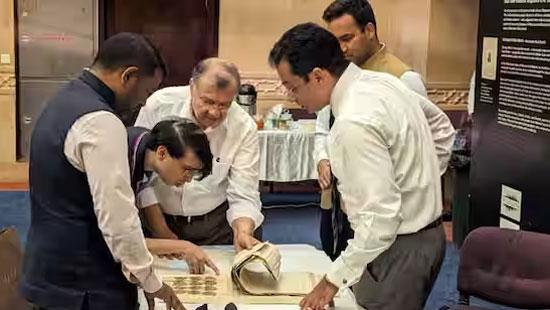Reply To:
Name - Reply Comment
 In a groundbreaking initiative, the Indian embassy in Oman, in collaboration with the National Archives of India (NAI), has successfully concluded a pioneering project to digitise and archive historical documents of the Indian diaspora in Oman. This remarkable project marks the first overseas endeavour by the NAI to preserve diaspora heritage.
In a groundbreaking initiative, the Indian embassy in Oman, in collaboration with the National Archives of India (NAI), has successfully concluded a pioneering project to digitise and archive historical documents of the Indian diaspora in Oman. This remarkable project marks the first overseas endeavour by the NAI to preserve diaspora heritage.
The project, titled "The Oman Collection – Archival Heritage of the Indian Community in Oman," saw enthusiastic participation from 32 prominent Indian families, mainly from Gujarat, whose roots in Oman trace back over 250 years. Over 7,000 documents in English, Arabic, Gujarati, and Hindi from these families' private collections have been meticulously scanned and digitised.
These documents, dating from 1838 to the early 20th century, include personal diaries, account books, trade invoices, passports, letters, and photographs. They paint a vivid picture of the Indian community's life in Oman, showcasing their cultural practices, social activities, and contributions to Omani society.
Indian ambassador to Oman, Amit Narang, emphasised the project's alignment with Prime Minister Narendra Modi’s vision of strengthening diaspora connections. "By documenting the history of the Indian community in Oman, we are rekindling our shared heritage and fostering deeper engagement," he stated.
Arun Singhal, Director General of the NAI, hailed the project as a historic milestone. "This marks the first time we have digitised diaspora documents from abroad, preserving the rich heritage and narratives of the overseas Indian community," he said.
The oldest digitised document dates back to 1838, offering a fascinating glimpse into the lives of early Indian settlers in Oman. These records, which will be available on NAI’s digital portal ‘Abhilekh Patal’, provide invaluable insights for researchers and the general public, shedding light on the Indian diaspora's historical journey to the West Asian country.
Additionally, the project recorded oral histories from older community members, capturing personal anecdotes and migration stories that enrich the archival records. This is the first such oral history initiative by the NAI, adding a deeply personal dimension to the documented history.
This initiative is a significant step in safeguarding the rich historical and cultural narratives of the Indian community abroad. Today, nearly 700,000 Indians call Oman home. Indian merchant families from regions like Mandvi and Surat have been integral to Omani society since the late 18th century, contributing to the social and economic fabric of cities such as Sur, Muttrah, and Muscat.(wionews)